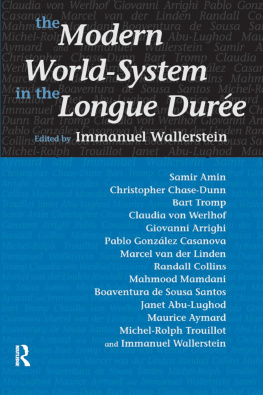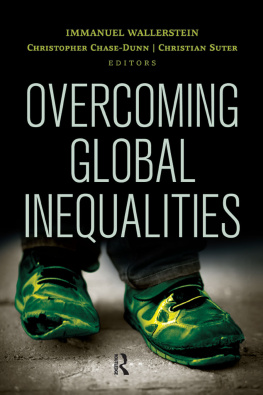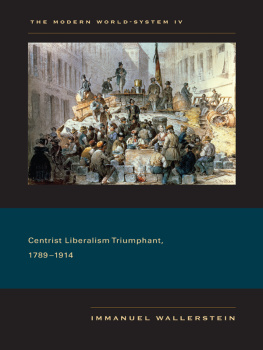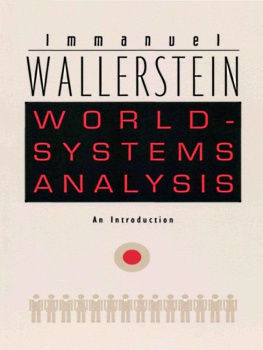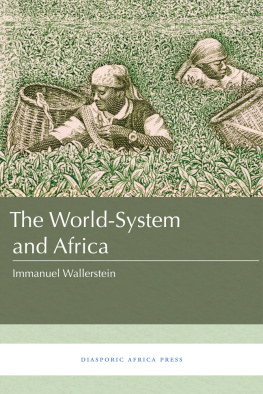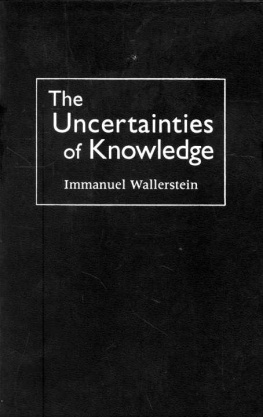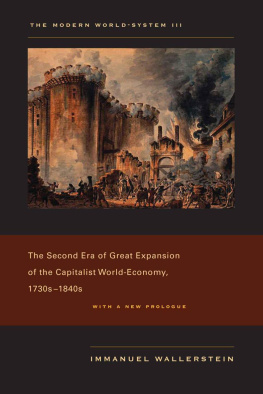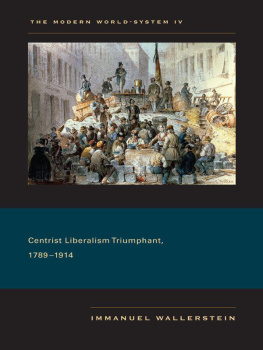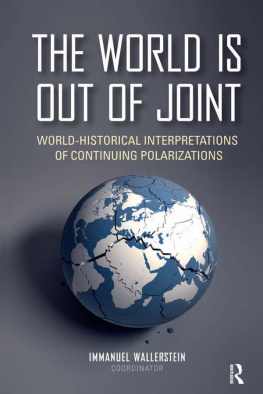THE MODERN WORLD-SYSTEM IN THE LONGUE DURE
Fernand Braudel Center Series
Edited by Immanuel Wallerstein
Alternatives: The United States Confronts the World by Immanuel Wallerstein
The Modern World-System in the Longue Dure edited by Immanuel Wallerstein
Overcoming the Two Cultures: Science versus the Humanities in the Modern World-System
Richard E. Lee and Immanuel Wallerstein, coordinators
THE MODERN WORLD-SYSTEM IN THE LONGUE DURE
EDITED BY
IMMANUEL WALLERSTEIN
First published 2004 by Paradigm Publishers
Published 2016 by Routledge
2 Park Square, Milton Park, Abingdon, Oxon OX14 4RN
711 Third Avenue, New York, NY 10017, USA
Routledge is an imprint of the Taylor & Francis Group, an informa business
Copyright 2004, Taylor & Francis.
All rights reserved. No part of this book may be reprinted or reproduced or utilised in any form or by any electronic, mechanical, or other means, now known or hereafter invented, including photocopying and recording, or in any information storage or retrieval system, without permission in writing from the publishers.
Notice:
Product or corporate names may be trademarks or registered trademarks, and are used only for identification and explanation without intent to infringe.
Library of Congress Cataloging-in-Publication Data
The modern world-system in the longue dure / edited by Immanuel Wallerstein.
p. cm.
Includes index.
ISBN 978-1-59451-036-6 (hardcover : alk paper) ISBN 978-1-59451-037-3 (pbk. : alk. paper)
1. Economic history. 2. CapitalismHistory. 3. EconomicsSociological aspects. I. Wallerstein, Immanuel Maurice, 1930
HC51.M595 2004
330.9dc22
2004014557
Designed and Typeset by Straight Creek Bookmakers.
ISBN 13: 978-1-59451-036-6 (hbk)
ISBN 13: 978-1-59451-037-3 (pbk)
Contents
Immanuel Wallerstein
Samir Amin
Christopher Chase-Dunn
Bart Tromp
Claudia von Werlhof
Giovanni Arrighi
Pablo Gonzlez Casanova
Proletarian Internationalism: A Long View and Some Speculations
Marcel van der Linden
Randall Collins
Mahmood Mamdani
Boaventura de Sousa Santos
Janet L. Abu-Lughod
Maurice Aymard
Immanuel Wallerstein
Michel-Rolph Trouillot
Immanuel Wallerstein
That there is an intimate connection between the real world in which we live and the ways we hope to better perceive and learn about that real world has been a premise of the work of the Fernand Braudel Center for the Study of Economies, Historical Systems, and Civilizations since its founding in 1976. When we decided to celebrate the twenty-fifth anniversary of the center with a conference during November 23, 2001, it seemed natural and useful to make this connection the centerpiece of our reflections about the current reality of the world and the state of our attempts to learn more about it.
We argue that we are living in a world-system that is a capitalist world-economy. We argue that this system has been in existence for a long while, circa five hundred years. We argue that this system is a historical system, that is, it has rules that govern its operations (which makes it a system) and it is constantly evolving (which makes it historical). This system did not always exist. It follows that, during its existence, there have been some constants or repeated patterns also that the prior history of the system creates the framework within which any particular action occurs. And of course, like all systems, our modern world-system is mortal. It will not last forever. It may well be in its terminal crisis now.
The ideas, the concepts, the knowledge that people and institutions within the system create is part and parcel of that historical system; this knowledge is itself both systemic and historical (just like any other structures of the system). If we are to understand these structures of knowledge, they must be historicized, evaluated, and explained within the framework of this system. We must discover their rules, how these rules came into existence, and how they frame what we might learn about reality.
So, of course, our authors seek to do their analyses within the Braudelian longue dure. But since they are also persons of today, they are deeply concerned with where the modern world-system as a whole and its structures of knowledge are heading at this moment and in the relatively near future. These are not exercises in futurology, but attempts to assess what are, what we might be, and the historical choices we are being called upon to make.
We are seeking to universalize the universals by particularizing the particulars. In this deep sense, the effort is neither nomothetic nor idiographic. It is part of a project to overcome the false dichotomy of the two cultures, to reunify the epistemology of knowledge, and to be socially useful in the analysis and transformation of the world-system in which we find ourselves.

Samir Amin
The confusion created in the dominant discourse between the concept of free market economy and that of capitalism is the root cause of a dangerous relaxation of the criticism leveled against the policies implemented. The market, which naturally refers to competition, is not capitalism. The content of capitalism is specifically defined by the limit to the competition implicit in the monopoly of private property, including the oligopolistic control by certain groups, to the exclusion of others. Market and capitalism are two distinct concepts; the really existing capitalism being the very opposite of what the imaginary market constitutes.
On the other hand, capitalism, abstractly viewed as a mode of production, is based on a market integrated into its three dimensions (market for products of social work, financial market, and labor market). However, the notion of capitalism as a really existing global system is based on the universal expansion of the market in its first two dimensions alone, since the creation of a real-world labor market is obscured by the perpetual existence of national political boundaries, despite economic globalization, which is therefore always truncated. Hence, the really existing capitalism is necessarily polarizing on the global scale, and the unequal development it engenders becomes the most violent and increasing contradiction that cannot be surmounted through its own logic.
The centers are the product of history, which permitted, in certain regions of the capitalist system, the establishment of a national bourgeois hegemony and a state that can equally be referred to as national capitalist. The bourgeoisie and bourgeois states are inseparable in this context and it is only the so-called liberal ideology that can speak of a capitalistic economysetting the state aside, contrary to all expectations. The bourgeois state assumes national dimensions when it controls the accumulation process, certainly within the limits of external constraints, but that is when such constraints are highly relativized by its own capacity to respond to their action, or even to take part in formulating them.

